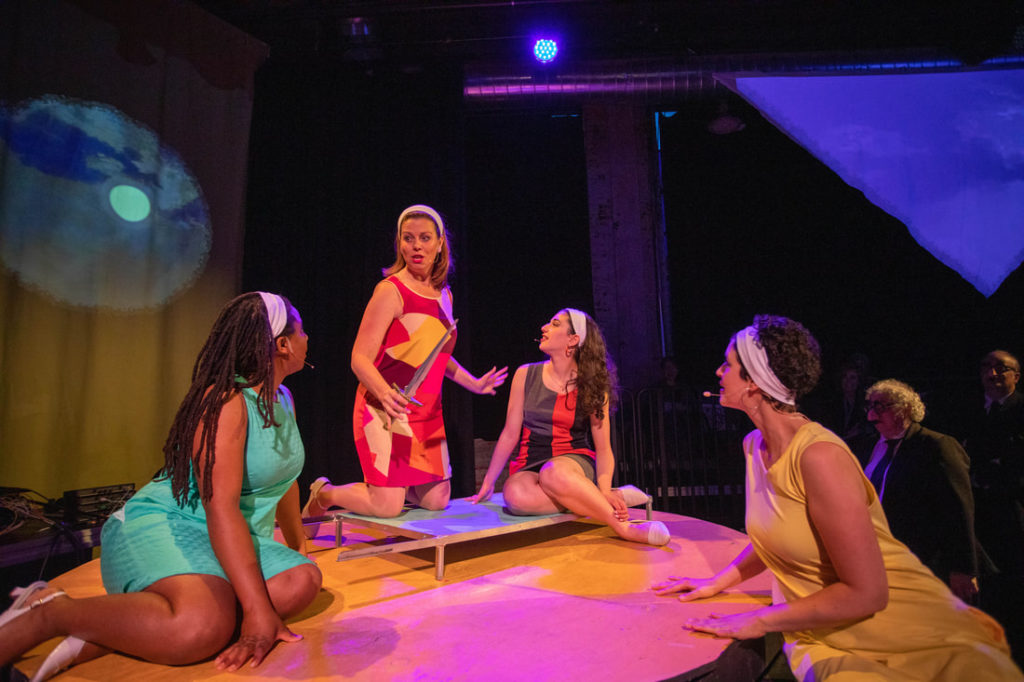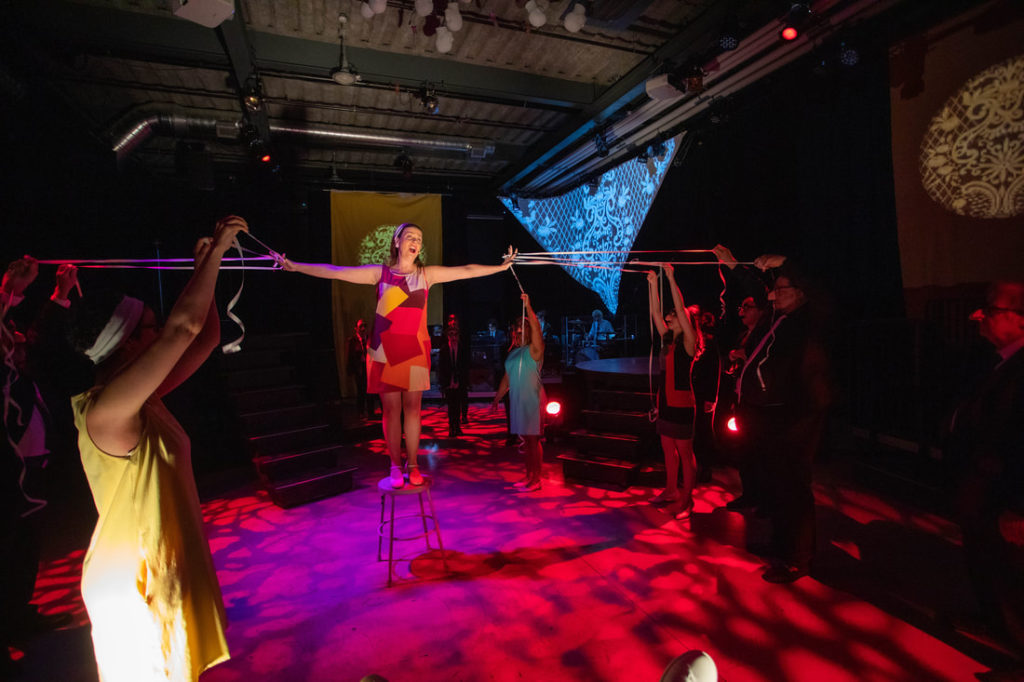
Daraja Hinds, Jennifer Mischley, Sophie Appel, Beth Alianiello Jennifer Mischley and cast of GOODNIGHT SWEETHEART, GOODNIGHT at Wilbury Theatre Group; photo by Erin X. Smithers.
Presented by Wilbury Theatre Group
Written by Darcie Dennigan
Music by Niki Healy
Directed by Josh Short
Music Direction by Milly Massey
Choreography by Ali Kenner Brodsky
Featuring Jennifer Mischley, Sophie Appel, Beth Alianiello, Daraja Hinds, Christine Treglia, Lydia Grosswendt
May 25 – June 11
The Wilbury Theatre Group
475 Valley Street
Providence, RI 02908
Content Warning: This production includes the use of strobe effects, and contains references to rape, sexual assault, and torture.
Review by Maegan Bergeron-Clearwood
PROVIDENCE, RI — In theory, Goodnight Sweetheart, Goodnight is in the same lineage as two of my all-time favorite musicals, Six and Lizzie: campy, riotously angry, mostly sung-through works that are more structurally akin to pop concerts than an integrated, plot-driven musical. It’s a niche mini genre of musical theatre that seeks to fill in the holes of patriarchal history by means of loud, glittery, feminist revisionism. The point of these concert musicals isn’t to tell a factual story, but to offer catharsis; to witness the violence of misogyny inflicted on a historically maligned figure, but also relish in a devilishly empowered version of her, however mythologized that version may be.
Darcie Dennigan’s new musical, with music by Niki Healy, is clearly striving for this kind of fantastical release. Here, we encounter Artemisia Gentileschi, a brilliant Italian Baroque painter whose work was historically overshadowed by a (literally) tortuous trial that she underwent after being raped by her painting teacher at the age of 17.
Goodnight Sweetheart, Goodnight is an angry musical, and rightly so, but it is one-note and unfocused in its rage. Some of these issues stem from dramaturgical instability: the musical is half 1960s girl group concert and half tongue-in-cheek art history lecture, but the connection between these two framing devises is never made clear, so the stakes are equally fuzzy.
Are these four singers figments of the lecturer’s imagination, or reincarnations of Artemisia and other historical figures, or figures from Artemisia’s paintings come to life (they sometimes reenact compositions from the paintings, but the characters’ names to don’t match the painting titles, so I don’t think this theory is correct), or something else entirely? The girl group members sing stories of abuse and oppression beneath an ironic veneer of Stepford Wife doo-wop politeness, then they veer into riot grrrl-inspired punk territory of gleeful revenge, but this shift is not grounded in character development or motivation, so I found it difficult to emotionally invest myself in anyone’s experience.
Practically speaking, the production suffers from sound design issues that made it very difficult for me (and my plus-one, as he mentioned after) to hear the actors’ vocals, so there is a chance that I missed some of the musical’s textual nuance or explanation of the framing device, but I still sensed an overall lack of structure.

Jennifer Mischley and cast in GOODNIGHT SWEETHEART, GOODNIGHT at Wilbury Theatre Group; photo by Erin X. Smithers.
The lack of dramatic story arc is mirrored by the static score and staging. Healy’s songs are playful homages to feminist music history, and Dennigan’s lyrics are biting and clever (“Aristotle is not my daddy” is one of my new favorite lyrics of all time) but the 13 songs all carry a similar energy. Thematically, they are largely about either victimization or vengeance, with little interest in any nuanced explorations of the characters’ inner lives.
They generally follow a pop song structural pattern – verse, chorus, verse, etc — which doesn’t quite work for a musical, because there’s no room for internal storytelling. Musicals like Lizzie and Six, while also inspired by popular music, often follow a version of this verse-chorus pattern, but they push against it enough so that each of the songs contains an arc, with build-up and resolution and, most importantly, character development, elements that are glaringly missing from the score of Goodnight Sweetheart, Goodnight.
Josh Short’s directing tries to add an energetic flair to the storytelling, giving us some playful visual moments that veer into a kind of performance art absurdism, a fun contrast to the overarchingly literal lyrics. There is still a lot of dead air left to be filled by the too-even music and plot, resulting in the ensemble members frenziedly trying to keep the audience engaged in between storytelling beats. I got the sense (particularly in the bloodbath second half) that Short was trying to set a campy tone, but in a musical about rape and domestic violence, that’s a risky place to go. It felt like the artistic team, including the performers, was unwilling to fully commit to that tonal shift, with frankly awkward results.
As an angry feminist killjoy and riot grrrl-lover myself, I appreciate why Dennigan wants to tell this story in this particular way: Artemisia’s biography makes so much sense as feminist allegory in our current moment, as every other month, it seems, the United States is new cycle inundated with images of yet another woman on trial being forced to defend her own story of abuse. Artemisia is a reminder that the tales of E. Jean Carroll and Anita Hill are as old as time. Why not write Artemisia a revenge fantasy?
There’s been a recent trend, in fact, in telling Artemisia’s story for the stage recently, with a 2019 opera entitled ARTEMISIA and, just last month, the world premiere of Lauren Gunderson’s Artemisia at Forward Theatre in Madison, WI. But there’s a particular risk attached to telling Artemisia’s story, because in centering her victimization, it is easy to fall into the trap that feminist art historians have been frustrated about for decades: the trap of historicizing Artemisia as a woman who was raped rather than a brilliant artist in her own right.
Goodnight Sweetheart, Goodnight might have been able to avoid this trap had it given its characters and story more dimensionality. Feminist rage is valid and deserves attention, but when it’s the primary emotional focus of a 60-minute musical, when it’s catharsis for the sake of catharsis, I leave the theatre wondering, “so what?”
I believe in the impulse behind this musical and in the theatricality of Artemisia’s story. I believe in the earnestness behind Dennigan’s and Healy’s talents, so my hope is that they continue workshopping the musical beyond its world premiere. This angry feminist is rooting for it.
